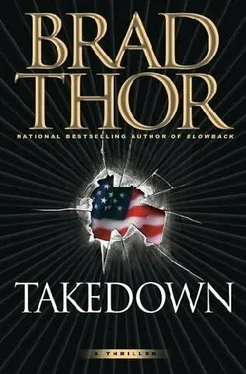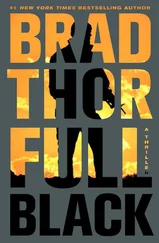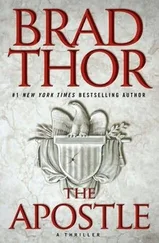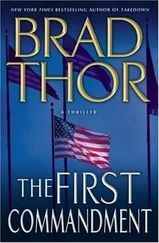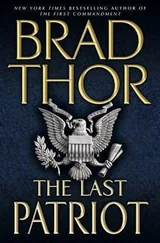When they arrived, the few people who were in the lobby were in an absolute panic. Harvath flashed his DHS credentials and was told by a man who identified himself as the mission receptionist that there had been an enormous explosion from somewhere within the building and that they couldn’t raise their ambassador, his assistant, or the ambassador’s security team.
After Harvath explained that they were there because terrorists had targeted the building and they believed that an attack was eminent, the receptionist assigned them the building’s only security guard and sped them into one of the lobby elevators for the ambassador’s office on the twenty-third floor.
The moment the doors opened, the guard showed them into the ambassador’s office, where they came upon the bodies of the assistant and the two bodyguards.
Borrowing the guard’s radio, Harvath called down to the receptionist to ask how long it had been since the man had last had contact with the ambassador, his assistant, or any members of the protective detail.
The man filled Harvath in on everything he knew, including the unannounced visitor with the diplomatic passport. He provided a full description, but when Harvath asked his next question, the receptionist became very quiet.
The entire staff of Libya House had been told that the twenty-fourth floor was absolutely off-limits, and even its existence shouldn’t be discussed with anyone. The receptionist had suspected it had something to do with the two stern-faced intelligence agents who had joined the mission from Tripoli. Faced with the very real fact that the building was under siege, the man shared the rest of what he knew.
Before the receptionist was even done speaking, Harvath and company. were rushing for the freight elevator. They were halfway there when the receptionist came back over the radio. Based on what he could see from his security panel, the freight elevator was no longer operational. What’s more, even though the rest of the building was supposedly empty, one of the main elevators had unexpectedly risen to the twenty-second floor and was now beginning to descend.
Though he couldn’t put his finger on why, Harvath had a very bad feeling about who was inside that elevator.
Shrugging off the pain in his shoulder, he made for the stairway, but Bob Herrington and Tracy Hastings were already in front of him.
Relieving the lumbering security guard of his radio and with Rick Cates and his bad knees bringing up the rear, Harvath hit the stairwell and barreled down as fast as he could go.
The landings, which he normally would have taken by gripping the handrail with his right hand and swinging his body around, were nearly impossible because of his wounds, and so he took the tight turns as best he could, relying only on his feet. More than once, his excessive speed caused him to slam his left side up against the wall before he could regain his path and tackle the next set of stairs. Invariably, he lost sight of Bob and Tracy, who were making much better time than he and considerably better time than Cates, who was sucking up the pain and moving as fast as he could.
Twice, Herrington and Hastings stopped on random floors to depress the elevator’s call button in hopes of stopping it. But without a keycard, it was no use. Once they finally realized they couldn’t stop it, the pair tore back into the stairwell and continued their mad dash down the stairs.
Within ten floors of the ground level, Harvath radioed Herrington on his Motorola. “Bob, what’s your status?” he asked.
It was a moment before Herrington replied, “At the lobby now. We’re going to intercept that elevator.”
“Negative,” said Harvath. “Wait for me.”
“What floor are you on?”
“Eight. I’ll be right there.”
“You’re not going to make it. The elevator’s already on four.”
“Wait, for me, Bob,” repeated Harvath.
“Listen, there’s a mail room kitty-corner from where you’re going to hit the lobby,” said Herrington. “That’s where we are. You can give us fire support from the stairwell when you get here.”
Harvath, who was now touching one, maybe two steps in between each landing as he flew down the stairs, was about to remind Herrington who was in charge of the operation, when Bob’s voice came back over his radio. He was counting down the elevator’s arrival. “Two. One. Bingo!”
Based upon the scene in the ambassador’s office, Harvath knew that if this was their guy, he wasn’t going to come easily, and based on Mohammed bin Mohammed’s extremely bloody history, neither was he.
Harvath expected to hear gunfire the second the elevator opened, but nothing came. Instead, Herrington’s voice crackled over his earpiece, “Shit. It’s not stopping. They’re going for the garage.”
“I’m coming up on the fifth floor,” said Harvath, his chest heaving for oxygen. “Wait for me in the stairwell.”
“We’re going to lose him,” replied Herrington.
“You’ve seen what this guy can do. We’re all going in together.”
Harvath waited for Bob to reply, and when he didn’t, Harvath knew it meant that Bob had decided to go without him. If he could have run any faster, he would have, but as it was, Harvath was tackling the stairs faster than anyone in their right mind should have. He’d be lucky if all he got out of it was a bruised shoulder from bouncing off of each of the landing walls.
Harvath was at the second floor when the ear-splitting thunder of automatic weapons fire started and filled the narrow stairwell. When he hit the lobby level, just one floor from the garage, Tracy Hastings’s frantic voice came over the radio yelling, “Man down! Man down!”
Harvath hopped the railing from one set of stairs to another and landed hard on his right foot, twisting his ankle. Bursting through the garage door, he could immediately see where Bob lay, ribbons of crimson spreading out from beneath his body and flowing downhill toward a metal floor drain several yards away.
Harvath ran to where they had taken cover alongside several dumpsters. Hastings was covered in blood up to her elbows, her hands pressed hard against Bob’s chest. Seeing Harvath approach, she looked up and the tears began to roll down her face. He didn’t need to ask. He knew. Bob was gone, and at that moment time stood still for Harvath.
It was Tracy pushing at his good shoulder, yelling, “Scot, go! Go!” that brought him back to reality.
At the far end of the garage, an engine had roared to life. Pulling an extra magazine as delicately as he could from one of the pockets of Bob’s vest, Harvath ignored the pain throbbing throughout his body and half limped, half ran toward the sound. He felt guilty beyond words, and while part of him wanted to bend over, puke his guts out and mourn the loss of a friend who had been like an older brother to him, another part wanted to bathe in the blood of the people who had just killed Bob Herrington. It was from that part of himself that he summoned the strength to keep moving.
The vehicle was accelerating now and the rev of its engine was quickly joined by another unmistakable sound-the heavy metal garage door rumbling open.
Harvath used his other radio to hail the receptionist and tell him to override the door, but the man said his system wouldn’t do that. Dropping the radio, Harvath ran faster, trying to close the distance with the unseen vehicle. His adrenaline all but spent, the Troy CQB assault rifle he’d taken back from Bob began once again to feel like a hundred-pound barbell. Harvath’s back, his arms, and his shoulders begged for him to drop it, but he refused. Having tapped the last of his reserves, he used his rage to push him forward, but it did little good. He finally closed on the ramp leading out of the garage and up to the street, only to see the taillights of a green Mini Cooper crest the top and pull a hard left, its tires screaming as they bit into the sidewalk, and it disappeared from sight.
Читать дальше
